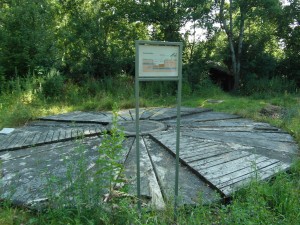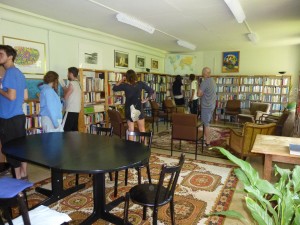A coal-fired power station, a Hitler youth camp and a Stazi centre for international espionage. None of these things could be further from the Zegg – a Centre for Experimental Culture Design based in Bad Belzig in East Germany. It’s difficult to believe in the site’s dark history as Nadia, our guide, walks us through the quiet organic gardens. The peaceful, leafy site has more the feel of a former university campus – with cottages dotted about next to car-free paths, the extravagant canteen and admittedly musty library and seminar centre – a smell typical, Nadia informs us, of former East German architecture.
I know I’m nearly there as I cycle past the local bus stop. It reads: ‚Zegg, Bad Belzig‘. They are well-established. The cycle ride in the sun was tiring, and we’ve missed dinner. But Nadia has kept aside enough food for the forty-strong army of Ecotopic cyclists. Rarely have I eaten in such luxury as here. Silver platters of scrambled curried tofu, freshly prepared marmelades, jams, dark grainy German rye breads as well as a selection of muesli, cereals, millet porridge and seven, maybe eight giant thermos of different teas greet us at breakfast. And while some Zeggers begin practising Yoga on the lower terrace, Nadia leads us off on a tour of the site and begins to tell us a bit of the history of Zegg.
The project first began in 1968 – a group of 50 people experimenting with alternative ways of living together in South Germany and Switzerland. They  rented various sites, until in 1991 they found the Zegg and moved in with another 40 people with less experience of communal living. Turbulent times, we are told, those first few years. Their focus was on promoting Peace, which they quickly realised as much about relationships between each other as about the forces which shaped the site’s former incarnations. Love, anger, sex and sexuality are apparently an important focus of the community. This much we can gather from the site guidelines we read on consent and gender equality, as well as posters advertising tantric workshops. But in a brief visit with a big group of cyclists, there’s maybe not so much time to touch on these more intimate themes with residents. We learn a great deal about their sewage system.
rented various sites, until in 1991 they found the Zegg and moved in with another 40 people with less experience of communal living. Turbulent times, we are told, those first few years. Their focus was on promoting Peace, which they quickly realised as much about relationships between each other as about the forces which shaped the site’s former incarnations. Love, anger, sex and sexuality are apparently an important focus of the community. This much we can gather from the site guidelines we read on consent and gender equality, as well as posters advertising tantric workshops. But in a brief visit with a big group of cyclists, there’s maybe not so much time to touch on these more intimate themes with residents. We learn a great deal about their sewage system.
‚It’s currently the biggest threat to our project‘, Achim tells us. ‚On the one hand, our water recycling system has won prizes on a national level, but the local authorities insist it is illegal. They want us to pay them and connect to the grid.‘ Zegg have invested in a system of land regeneration called ‚Terra Preta‘ – an ancient technique used by farmers from the Amazon to Iran where organic waste is mixed with biochar to create extremely fertile soil. Other waste water is processed through beds of willow which pump it back into the earth.
 A waste water chamber for the ‚Terra Preta‘ system
A waste water chamber for the ‚Terra Preta‘ system
‚May I slap you?‘ Asks Nadia. Mosquitos are everywhere. A minor inconvenience in paradise? The others are getting onto their bicycles to go to visit another project. I check with Nadia if I can sneak off to the site internet cafe and do some photocopies. There is never a dull moment on this biketour, but a few hours of Peace, reading and writing, skinny dipping in the natural pool and wandering through the woods are much appreciated. ‚In other cultures, the Global South communities spend all their time together. They have no need to be alone as we do in the North‘ muses Achim.
I’m skeptical. But with a healthy atmosphere where community members live comfortably, with the magical formula of space, pace, care and organisation, he might be onto something. They are an amazingly open community, hosting a n umber of festivals every year and a transient population of guests as large as the number of residents themselves. ‚After some tensions, we decided to have two weeks a year with no guests. We also have an area of the site which is for residents only.‘ During the winter, numbers shrivel and the some of the community engage in an ‚intensive community process‘ of around 50 residents. ‚How do we join?‘ Chuckles all round. ‚It takes a long time to get in and it’s quick to get out!‘ A 5-week course takes place every year for newcomers. And there are currently no rooms. In fact nobody ever has their own room as Zegg members do not believe in private property. ‚You forget Achim. We will be converting lofts this winter.‘ smiles a member of the Building circle. The community design Zegg follows is based on consensus decision making – an alternative, more horizontal alternative to democracy. Various ‚circles‘ focus on different issues – a Housing circle, a Shopping circle, etc. from which 2 representatives join a larger ‚plenary‘ which takes place roughly every month. The system is called ‚Whole-ocracy‘, a form of ‚Sociocracy‘ originally adapted to business environment. Achim assures us that Zegg is as much a company as a community.
umber of festivals every year and a transient population of guests as large as the number of residents themselves. ‚After some tensions, we decided to have two weeks a year with no guests. We also have an area of the site which is for residents only.‘ During the winter, numbers shrivel and the some of the community engage in an ‚intensive community process‘ of around 50 residents. ‚How do we join?‘ Chuckles all round. ‚It takes a long time to get in and it’s quick to get out!‘ A 5-week course takes place every year for newcomers. And there are currently no rooms. In fact nobody ever has their own room as Zegg members do not believe in private property. ‚You forget Achim. We will be converting lofts this winter.‘ smiles a member of the Building circle. The community design Zegg follows is based on consensus decision making – an alternative, more horizontal alternative to democracy. Various ‚circles‘ focus on different issues – a Housing circle, a Shopping circle, etc. from which 2 representatives join a larger ‚plenary‘ which takes place roughly every month. The system is called ‚Whole-ocracy‘, a form of ‚Sociocracy‘ originally adapted to business environment. Achim assures us that Zegg is as much a company as a community.
‚I’d love to live somewhere like this‘ Matteo says quietly at the dinnertable, ‚but I could never afford it!‘. Like many of the impressive projects we have visited so far in Germany, what differentiates them from the squats and social centre I remember from last year’s biketour in Catalunya is the commercial aspect. To live here, prospective residents must make a large long term loan to the Zegg. ‚In fact, we are no longer accepting loans, only donations. There are some, but not many.‘ Seminars produce a large part of the Zegg’s income. And even guests camping and working five hours a day must pay to stay.
The sound of a harmonica drifts through the small woodland clearing which has been our sleeping place for the past two nights. It’s time to wake up, pack up and get on your bike! It’s 75 kilometres to the next camping spot, I hope there’s time to post this article.







